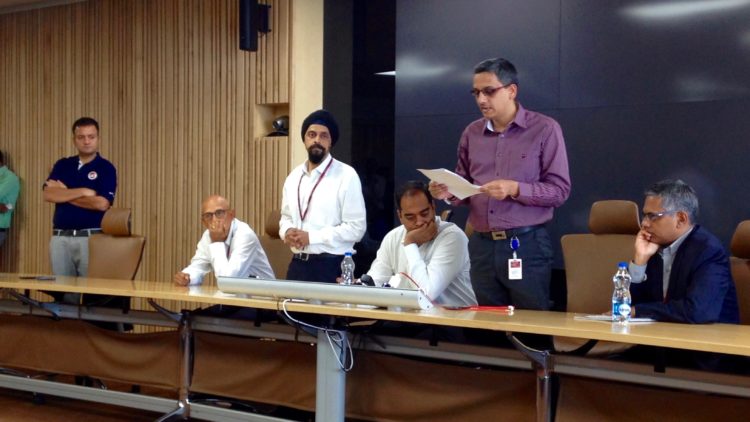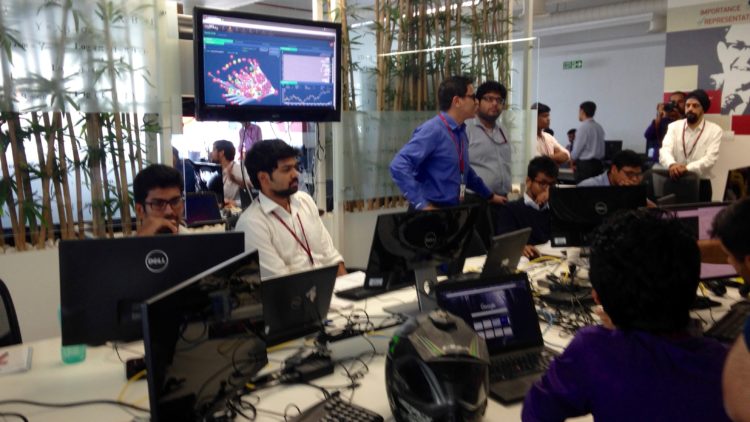
Photo credit: adrenalinapura / 123RF.
Here’s an age-old story with a twist – two people running a company have a falling out. The resulting upheaval destabilizes the company, and in the aftermath, it tries its best to recover.
Okay, now factor in that the two people are going through a divorce – from each other – and you have the rocky patch that Indian unicorn Mu Sigma’s been traversing since they announced the breakup in May.
Now factor in that the two people running a company are going through a divorce – from each other.
Yesterday, in a press conference attended by a roundtable of reporters, as well as a sizely audience from the data analytics firm itself, the aftermath seemed officially begun as founder and chairman Dhiraj Rajaram made public some of the answers to questions the Indian tech community’s been asking since May about him, Mu Sigma CEO Ambiga Subramanian, and their split.
The gist was pretty straightforward and fit onto a double-sided (and nicely formatted) piece of paper – Dhiraj is now the CEO of Mu Sigma. US-based private investor General Atlantic and Sequoia Capital would remain investors in the company. Ambiga’s shareholding in the company – roughly 24 percent – would transfer to Dhiraj, who previously held about the same stake. Other financial details between the two individuals would remain an undisclosed family matter.

Mu Sigma management reads aloud official statements at the press conference yesterday. Dhiraj stands on the left. Photo credit: Tech in Asia.
“Ambiga has agreed to support me in continuing to build my dream and will continue to be on our board. It is good to finally put all distractions behind,” Dhiraj said at the conference.
It was a gentlemen-only management panel. Ambiga was noticeably absent, along with – as Dhiraj pointed out when questioned – the other members of the board.
Shady shade shade

Photo credit: Elenathewise / 123RF.
The press conference was held in the third hour of a combined conference, press lunch, and facilities tour, a clear attempt to draw everyone back to Mu Sigma’s roots and mission. I watched what they called a “baby robot” learn to navigate a field while avoiding projected red dots. One project attempted to take my resting heart rate by predicting the amount of bloodflow in my face. Another project, designed to measure input (and identify slackers) during business meetings, tried to match up a sea of reporter faces with its facial recognition software.

Our facilities tour. Photo credit: Tech in Asia.
The point was to shed some light upon company developments, which is understandable because things have been shady like a tree this year over at Mu Sigma, which has bases in Chicago and Bangalore. Granted, a lot of the mystery came from how it was hard to get a clear picture of what was going on.
Things have been shady like a tree this year over at Mu Sigma.
Less than a month ago, two anonymous individuals told Livemint Dhiraj was planning to gain control of the company by buying enough of Ambiga’s and General Atlantic’s stakes to take a majority stake. That came a few weeks after the publication reported Ambiga and General Atlantic were looking to sell their respective stakes and cash in big.
Meanwhile, undisclosed sources within the firm told ET last month that loyalties were divided between Dhiraj and Ambiga, with nine of 15 of the firm’s leadership leaving since May. Was Ambiga starting her own venture? Was she going to compete with the firm?
Elephant in the room

Photo credit: javarman / 123RF.
Mu Sigma attempted to clear the air today – and perhaps throw a little of the shade back – reading aloud official statements in the meeting that emphasized putting down some of the talk of the town. “There has been a lot of needless and inaccurate speculation around our involvement in Mu Sigma,” said General Atlantic’s Mark Dzialga in the statement third on the list but first read, going on to reaffirm the investment firm’s role as Mu Sigma partner and shareholder.

Ambiga Subramanian, former CEO of Mu Sigma.
“All rumors about me starting a competitive firm are untrue,” said Ambiga in a statement released by the company.
As far as her future plans, those remain a mystery. “She will do something amazing. She is one of the most talented people in the world,” Dhiraj told the room, adding that he hopes she stays “on the board as long as she wants” and calling her “one of the smartest people I have ever known in my life.”
Dhiraj founded Mu Sigma in 2004. Ambiga, a former Motorola engineer, joined the company in 2007 as a director and replaced Dhiraj as CEO in February this year, three months before the divorce announcement.
Following her exit, Dhiraj – in addition to holding founder, chairman, and CEO titles – now holds a total 51.6 percent undiluted stake in the company.
It would be incorrect to say there has been no impact on the business.
Though Mu Sigma’s estimated valuation has varied greatly – estimates have ranged from US$800 million to US$1.2 billion – Dhiraj and his panel refused to disclose any numbers beyond assuring everyone the firm was still a unicorn.
He also mentioned that all Mu Sigma employees are under a non-compete clause.
“It would be incorrect to say there has been no impact on the business,” Dhiraj shared, sounding pained, though stressing that the impact was more personal than professional.
Splitsville

Photo credit: Pixabay.
Whether you’re a delivery boy or company chief of operations, it sucks when your personal and professional lives collide. It sucks even more when both are the interest of a couple dozen media publications. Factor in working for one of India’s startup success stories, and the stakes shoot up even higher.
Dhiraj said the changes announced today went into effect last Friday, but Mu Sigma’s saga has dragged on much longer for the public, the startup’s employees, and Dhiraj and Ambiga themselves. “The Indian press doesn’t allow anything to stay private,” he tells Tech in Asia.
I’ve been living in a fishbowl.
Mu Sigma’s shift in management went into effect mere days ago, but whispers had been flying. That definitely bites if you’re management. It bites differently if you’re the average Mu Sigma employee, wondering what’s happening in a distant boardroom.
“Everyone knew [about the split],” Dhiraj shares. “I’ve been living in a fishbowl.”
The press conference seemed a little more like an aquarium, but he brings up that in other settings, such a situation might not have been so novel. He references the US, where Mu Sigma also has an office, and where 40 to 50 percent of couples divorce. “It’s not a big deal [there],” he tells the room.
With the number of startups in India, several of which have family members in management, Mu Sigma’s certainly not the last company in India to go through such a situation. Dealing with it in the limelight is a painful part of being a successful startup in the country.
Dhiraj brings up his and Ambiga’s teenage son and admits, “This is more public than I would have liked it to be.”
This post What happens when the two people running a unicorn go through a divorce appeared first on Tech in Asia.
from Tech in Asia https://www.techinasia.com/mu-sigma-ceo-dhiraj-rajaram-divorce-aftermath
via IFTTT
No comments:
Post a Comment